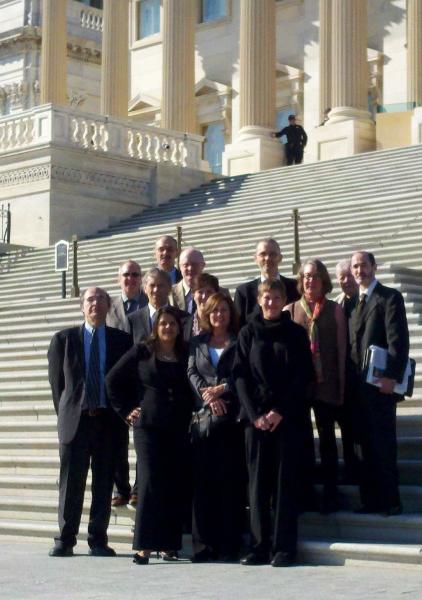Booksellers Share Their Experiences of Sales Tax Fairness Advocacy Day in D.C.
 |
| The participants in ABA’s Sales Tax Fairness Advocacy Day gathered on the steps of the U.S. Capitol. |
With the movement to pass a national sales tax fairness bill gaining momentum in Congress, Bookselling This Week asked three booksellers who participated in the American Booksellers Association’s recent Sales Tax Fairness Advocacy Day in Washington, D.C., about their experiences and the importance of meeting with legislators.
Among the ABA member booksellers participating in the November 2 event to advocate on behalf of a national sales tax fairness solution were David Didriksen of Willow Books & Cafe in Acton, Massachusetts, Liz Murphy of The Learned Owl Book Shop in Hudson, Ohio; and Betsy Rider of Otto’s, A Booklover’s Paradise, in Williamsport, Pennsylvania.
“It was a great honor to become the face of the unfair tax issue now threatening retail bookselling,” said Rider. “As we met with Washington lawmakers and their associates, I pleaded for new legislation to level the playing field by requiring Internet companies to collect and remit sales tax on their sales.”
“I think it was tremendously important for us to connect some faces to the problems of small businesses, which all in D.C. profess to support,” said Didriksen. “Politically, the sentiment was overwhelmingly sympathetic to our situation and that of other small retailers. Clearly, the entire structure is based upon access to decision-makers (albeit through some layers of red-tape), but I am convinced that we got our message through. I found the entire trip to be very instructive and helpful. The fact that some bi-partisan legislation is actually being introduced is a very positive sign. We need to keep up the pressure, though, so that the momentum continues in our direction.”
“I was pleased to be part of ABA’s Sales Tax Advocacy Day in Washington, D.C.,” said Learned Owl’s Murphy. “I think the fact that 20 of us were visiting House and Senate offices that day — and that it was written about on the front page of Roll Call — raised the overall level of awareness of the two bills designed to create sales tax equity. I followed up with e-mails to all. I think that, in addition to touting the importance of this issue, this visit opened the door to a relationship with elected officials in Ohio. I plan to follow up this week, reminding all that ABA has endorsed the Marketplace Fairness Act, and urging the aides with whom I met to encourage their legislators to support it.”
“We are very grateful to Betsy, David, and Liz, and, indeed, all those who made the trip to Washington — especially at one of the busiest times of their business year — to advocate in support of a national sales tax fairness solution,” said ABA CEO Oren Teicher. “There is no substitute for a face-to-face meeting with legislators. And that these booksellers and our colleagues from other industries would do so at the holiday season made it clear to their lawmakers how serious sales tax fairness is to Main Street businesses. By all accounts, the Sales Tax Fairness Advocacy Day was very successful, and that is because of the participation of such a diverse array of retailers.”
The Sales Tax Fairness Advocacy Day kicked off with an evening reception on Tuesday, November 1, where attendees were briefed on the latest developments regarding the Marketplace Equity Act, introduced in the House in October by Rep. Jackie Speier (D-CA) and Rep. Steve Womack (R-AR), and another bill, the Marketplace Fairness Act, which was slated to be introduced in the Senate by Sen. Richard Durbin (D-IL) the following week. (Sen. Durbin introduced the bill on November 9.)
Importantly, both bills contain small-seller exemptions. In the Senate bill, a store would have to have more than $500,000 in remote sales nationally to trigger nexus in a state other than its own. In the House bill, unless a store has more than $1 million in remote sales nationally (i.e. Internet, catalog, and/or toll-free sales, but essentially Internet sales), or more than $100,000 in remote sales into any one state, a seller is exempt from collecting and remitting sales tax in other states besides its own.
On Wednesday, the attendees gathered to meet with staff from Rep. Speier and Womack’s offices to discuss the Marketplace Equity Act, which provides states with the authority to require remote retailers, including online-only businesses, to collect and remit sales taxes. Afterward, the group met with staff from Sen. Durbin’s office to learn more about the Marketplace Fairness Act, legislation that would provide states with authorization to require remote sellers to collect and remit state sales tax.
After the meeting with staff from Sen. Durbin’s office, the attendees spent the afternoon attending individual appointments with their legislators, arranged beforehand by ABA staff.
“I found the whole experience to be enormously edifying,” said Didriksen. “Dealing with the huge bureaucratic machinery of Washington, D.C., was daunting, to be sure, but the lobbying efforts were well-coordinated and efficient. I was also surprised by the extent to which folks on Capitol Hill were interested to hear from us. The plight of Main Street America still evokes a visceral response from politicians, even if they are not always sure how to help.”
Said Rider, “[My legislators] graciously accepted my statements and questions, and I hope they will keep them in mind as they respond to the two bills being formulated on the subject.”